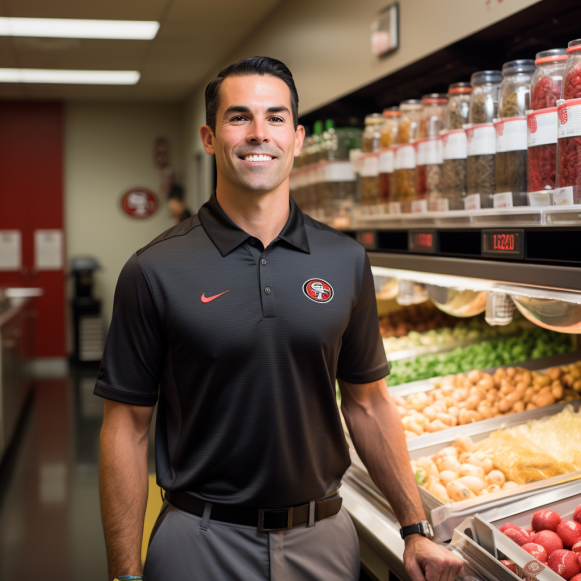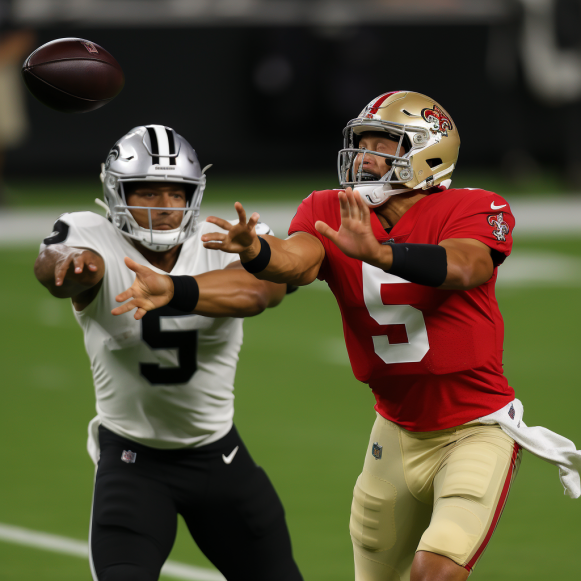Taste of victory: For the SF 49ers, what they put on their plates and into their bodies is part of the job

49ers’ director of nutrition Jordan Mazur offers a peek at players’ dietary demands
SANTA CLARA – After the first practice of training camp, the 49ers went to their refueling station, a fully stocked cafeteria located between their practice fields and Levi’s Stadium.
At dinner, over 90 filets of grilled salmon were devoured. This, however, is not a fish story, despite the fact that salmon, broccoli, and brown rice are the most popular meals among players in a routine-oriented world.
When it comes to player-specific diets, there isn’t much consistency for a roster that starts with 90 men in camp (plus coaches and staff) before reducing to 53 for the regular season.
“Our goal is to provide the highest quality and as much as we can for them, to take the guesswork out of it for them when they leave this building,” Jordan Mazur, the 49ers’ director of nutrition, told this news organization in an exclusive interview.
When Mazur joined the 49ers seven years ago, only one-third of the NFL’s teams, beginning with the New England Patriots, had a full-time dietician. Now, 30 of the 32 members are on board, with the remaining members relying on a consultant.
“It’s grown a lot in the last five to ten years,” Mazur said. “Nutrition is not a new concept. Everyone eats. However, nutritional sciences have emerged, and we are beginning to understand their significance.”
Mazur mapped out what’s involved in their program to help explain a 49ers’ player’s dietary restrictions and demands, while respecting players’ privacy and not divulging specific meal plans:
TEAM WITHIN A TEAM
Different body types require different positions, creating a team-within-a-team situation. A 180-pound wide receiver’s energy requirements are obviously different than those of a 315-pound offensive lineman. Receivers and defensive backs must sprint, whereas linemen must be strong while moving little.
“We start by looking at their lean body mass, body composition, how much muscle mass they have, and how much body fat they have,” Mazur explained. “That can help them calculate their requirements.” Everyone is unique.”
CALORIC CONSUMPTION
To maintain their ideal weight, skill-position players (such as wide receivers) typically require 2,500 to 4,000 calories per day. Some people may have difficulty gaining weight, so more calories are required.
“Then there are linemen who can consume up to 6,000 calories per day,” Mazur explained. “When you consider the volume of food, that becomes part of their job.” It becomes challenging. You must spread it as widely as possible.”
A defensive lineman, for example, may arrive at 6:30 a.m. for his first breakfast, return shortly thereafter for breakfast No. 2, then have a pre-practice snack, a post-practice snack, lunch, dinner, and “then afterward, you can call it a snack, but in reality, it’s another dinner,” Mazur added.
SHAKES WITH PROTEIN
The 49ers appear to be constantly producing protein shakes, each tailored to a specific player. They have a smoothie station as well as a mobile app where players can create their own drink.
“I take supplements in the form of smoothies.” “It’s never a true substitute for food,” Mazur cautioned. “I want them to eat as many whole, natural foods as possible.” If a man consumes 6,000 calories per day, the volume of food consumed must be substantial. We need liquid calories to supplement.”
A “PB Gainz” shake contains 950 calories, as well as protein and clean ingredients. Some players consume two per day.
SECRET WINNER
One surprising way to boost your calorie count is to use olive oil, which Mazur recommends for its healthy fats, calories, and anti-inflammatories. “It adds a lot of good calories that these guys need without a lot of sugar or ingredients that they may not need.”
ARE THERE PERSONAL CHEFS?
Millionaires can afford personal chefs, but few 49ers do, especially since the team serves breakfast, lunch, dinner, and snacks at their Santa Clara headquarters.
“Our goal is to provide the highest quality and as much as we can for them, to remove the guesswork when they leave this building,” Mazur said. “I’m not naive enough to believe that guys aren’t eating what they want or leaving here without getting what they want. However, I will not provide it for them.”
Even if he creates a meal plan for them, players may not strictly adhere to it if it requires them to go grocery shopping or meal prep on their own.
CODE DE CHEAT
Pro athletes cheat… on their diets. Their most popular comfort foods are ice cream and chicken wings.
“Everything has its time and place.” “Food is meant to be enjoyed,” said Mazur. “These guys consider food to be their job. Consider the possibility of having a direct impact on your work. This is their source of income. Their greatest asset is their health. They have control over what they put into their bodies in terms of food.”
CARB-LOADING
A low-carb diet appears to be a no-no for football players. Carbohydrates, such as fresh fruits, grains, rice, beans, and breads, should make up nearly half of their diet.
“Carbs are their best friend,” said Mazur. “Football is an explosive sport, and carbohydrates will help fuel them the most for that type of sport, with explosive movements followed by rest periods.”
“Protein is really important and takes up another 25 to 30 percent of their diet, depending on their needs,” Mazur added. “You fill the rest with good fats.” Fat has a bad reputation. There is, however, healthy fat: avocado, olive oil, nuts, and seeds.”
ALLERGIES TO FOOD
Meal plans differ depending on the player for reasons other than caloric requirements. Consider your appetite, metabolism, taste preferences, and allergies, the most common of which are nut and milk allergies. Don’t forget about shellfish, either.
HELP WITH SUPPLEMENTS
The NFL’s policy constantly reminds players that they have control over what they put into their bodies, a point that comes up whenever someone is penalized for violating the performance-enhancing drug policy. Third-party dietary supplements are frequently blamed by players.
“It’s a source of danger for these guys, so I try to guide them as much as I can and be an open door for them to make an educated decision when it comes to supplements,” Mazur explained.
He’ll want to know why they’re taking it, if it’s been independently tested for banned substances, and where they got it, possibly through an endorsement deal or “a buddy.”
WHO RECEIVES IT
While proper nutrition is popular, rookies are usually the most challenged. Some come from large universities with a strong nutrition background. Others come from small schools and must be taught the fundamentals of what a carbohydrate, protein, and fat are and what they do for your body. Veterans step forward to advocate for Mazur.
“Once you get the buy-in and convince and educate guys to adopt it as a habit,” Mazur said, “maybe they’ll have more energy at practice, be more hydrated, and cramping won’t be an issue.” Perhaps they gain lean body mass and suddenly pay attention to what they require; perhaps they avoid fast foods, sugars, and candies.”
All of this can lead to the sweetest taste of all: victory, and possibly the 49ers’ first Lombardi Trophy in 29 years.



